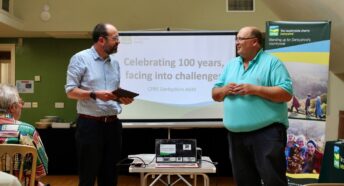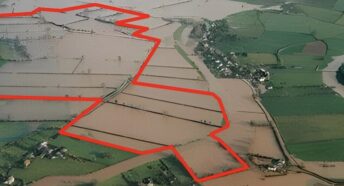CPRE Kent welcomes Medway Council attack on proposed housing hike

CPRE Kent today applauds Medway Council’s Cabinet for its withering rejection of proposed government policy that would see it face an “unrealistic and totally unacceptable increase in the levels of housing” to be built in the district.
Further, we support the council’s call for Kent and Medway MPs, as well as other local authorities in the county, to join it in expressing to central government the concerns that an increasing number of people and organisations have about the burden of housing development Kent would be expected to take.
It is telling that a Conservative-led council should offer such trenchant criticisms of the DCLG’s own policies.
After yesterday’s Cabinet meeting (Wednesday, October 25), the council released a fierce statement blasting the DCLG’s demands:
“At yesterday’s meeting of Medway Council’s Conservative Cabinet, members strongly rejected proposals from the Department for Communities and Local Government which would see an unrealistic and totally unacceptable increase in the levels of housing required within Medway,” it said.
“Independent consultants have previously determined Medway’s Objectively Assessed Need (OAN) for housing as 1,281 dwellings/year.
“This figure has been used as a core component of Medway Council’s Local Plan to assess the housing needed over the period covered by the plan (2012-2035).
“This work has already produced the ambitious figure of 29,463 homes required by 2035, [for] which the council has been tirelessly working to identify the land and infrastructure necessary to facilitate delivery.
“However, the flawed proposed government methodology would see a 29% uplift in the level of housing to be allocated to Medway, calling instead for 38,295 houses in the same period.
“The government may state that its approach represents a 5% increase across England, but there is significant variation in this figure.
“Within the South East, the average rise is an appalling 35%, yet the Conservative Group is disgusted to find that there are other local authorities who have in fact seen a fall in their level of housing need.
“Such authorities are largely in the north of England, reflecting the disjointed and disproportionate nature of this policy compared to the efforts the government has already been making to rebalance the economy and deliver the infrastructure in the north that would be able to support these homes.”
Responding to the statement, CPRE Kent vice chairman Richard Knox-Johnston said: “We welcome Medway Council’s statement as a first realistic reaction to the increased housing demand it has been allocated and the problems it will cause.
“CPRE has been saying for some time that the infrastructure is simply not sufficient to deal with the proposed new figures, while the DCLG approach does not address the real needs of young people and young families.”
Stressing further the views of his council, leader Alan Jarrett said: “Medway, like most of the South East, is an area already straining at the seams to accommodate the originally proposed level of growth, and therefore any increase to this figure will absolutely not be tolerated by Medway Conservatives.
“Whilst the Cabinet recognises the need for housing, and is already leading by example through the establishment of its own housing company, the sustainability of the government’s plan must be seriously questioned.
“Medway simply does not have the physical or social infrastructure to cope with any increased housing target. It is extremely unrealistic of DCLG to propose a change of target in the face of developers’ reluctance to build homes and a current lack of skilled workers to deliver these homes.
“Myself and my Conservative colleagues implore the three Medway MPs, and other Kent authorities and MPs, to follow suit in conveying to DCLG the severity of the concerns we have here in Kent and Medway.
“If the government were to ignore comments from this council, not only would this jeopardise the reams of work that have already gone into the production of Medway Council’s Local Plan but we face a scenario in which existing housing delivery targets will not be able to be met.
“On behalf of Medway residents, the Conservative Group will not stand idly by whilst our green spaces and our housing market are decimated.”
Thursday, October 26, 2017
- A number of important documents have yet to emerge. For example, a rigorous transport plan and a finalised air-quality assessment. The latter is critical given that allocations at Teynham will feed extra traffic into AQMAs.
- There seems to be no coherent plan for infrastructure delivery – a key component of the plan given the allocations being proposed near the already crowded Junction 7.
- There seems to have been little or no cooperation with neighbouring boroughs or even parish councils within Swale itself.
The removal of a second consultation might have been understandable if this final version of the plan were similar to that being talked about at the beginning of the consultation process. It is, however, radically different in the following ways:
- There has been a major shift in the balance of housing allocations, away from the west of the borough over to the east, especially around the historic town of Faversham. This is a move that raises many concerns.
- A new large allocation, with accompanying A2 bypass, has appeared around Teynham and Lynsted, to which we are objecting.
- Housing allocations in the AONB around Neames Forstal that were judged “unsuitable” by the council’s own officers have now appeared as part of the housing numbers.
- Most of the housing allocations being proposed are on greenfield sites, many of them on Grade 1 agricultural land – a point to which we are strongly objecting.
Concerns about the rush to submit the plan
The haste with which the plan is being prepared is especially worrying given the concentration of housing in Faversham. If the town is to take a large amount of new housing, it is imperative that the policies concerning the area are carefully worked out to preserve, as far as possible, the unique nature of the town. The rush to submit the plan is likely to prove detrimental.
As Swale does not have a five-year land housing supply, it is open to speculative development proposals, many of which would run counter to the ideas contained in the current plan. Some are already appearing. This is a common situation, and one that, doubtless, is a reason behind Swale’s haste.
Our overriding fear, however, is that this emphasis on haste is ultimately going to prove counterproductive. This is because it is our view that the plan, in its current form, is unlikely to pass independent examination. We are urging Swale to listen to and act upon the comments being made about the plan and to return the plan to the council with appropriate modifications before submitting it to the Secretary of State.
Essentially, this means treating the current consultation not as the final one but as the ‘lost’ second consultation.
The consultation ends on Friday 30 April and we strongly urge residents to make their opinions known if they have not already done so.
Further information








